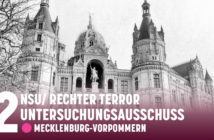On the occasion of the two hundredth day of trial, and marking two years since the beginning of the NSU-trial against Beate Zschäpe, Ralf Wohlleben, André Eminger, Holger Gerlach and Carsten Schultze in the higher regional court (German: Oberlandesgericht, hereafter OLG) in Munich, NSU-watch would like to present a short appraisal of the proceedings:
1. Amongst the 446 witnesses (22.04.2015) that have testified around 50 are either still active today, or were active at some earlier point in time within the Neo-Nazi network surrounding the NSU. To this day, only a few of the witnesses have shown any sincere desire to assist in the investigation and clarification of the NSU-murders. Lying, downplaying, and claiming not to remember are much more frequently observed behaviors amongst witnesses – and all without consequence. Unlike other typical court proceedings, there has, as of yet, been no penal action taken against any witnesses, including obvious cases of perjury. This kind of conduct lends self-confidence to the neo-Nazis and encourages them to more boldly and publicly lie and then boast about it through social media – as was the case with Thomas Gerlach, a member of the saxon chapter of the neo-Nazi club ‘the Hammerskins.’
The testimony and the manner in which it has been given by the witnesses coming out of the neo-Nazi scene show with clarity that, in the matter of the NSU, we are concerned with a network of militant neo-Nazis that remain supportive of each other to this day when it is a matter of protecting one of their comrades and the glorification of the NSU’s deeds. The thesis that the NSU was an isolated cell with a small group of supporters – which is still maintained by the prosecuting authorities – can no longer be supported.
2. The trial in front of the OLG in Munich has made an essential contribution to the creation and deployment of further parliamentary investigative committees in three federal states (Baden-Württemberg, Hessen, and Nordrhein-Westfalen). In these committees, as it has been the case in the proceedings in Munich, the relevant security services have shown little interest in any serious demystification of the NSU-complex. Security services have continued to raise the shield of ‘protection of confidential sources’ against any honest clarification of the NSU-complex on the whole. Files disappear, in another place a file long believed to be lost reappears. Permission to give testimony (necessary for many security agency officials) is delayed and given only after significant public pressure is raised – as was the case of the Brandenburgian informant Carsten “Piatto” Szczepanski, who appeared in court in a disguise.
During cross-examination and in their comprehensively researched requests for evidence, the attorneys representing the co-plaintiffs repeatedly point out inconsistencies and contradictions. These inconsistencies are also to be seen in the work of the secret services – like the recent example of inconsistency in regard to the presence of an employee of the state Verfassungsschutz (Bureau of Constitutional Protection) at the murder scene of Halil Yozgat. These and other requests for evidence point out that a comprehensive clarification of the serial murders and attacks perpetrated by the NSU require a will for clarification from everyone.
3. We say: without considering racism within our society and its institutions, the NSU-complex cannot be clarified. The testimony of the victims of the nail bomb attack on Köln’s Keup street made it clear how close the agreement is between the neo-Nazi attacks and the racist investigative practices from various agencies and the judiciary, as well as other parts of society. The trial has shown itself here – unlike in the parliamentary investigative committees – as the place where the victims, their families, and others who have been effected by the violence could contribute to the clarification of the murders in their role as active co-plaintiffs. They are getting the hearing that has been refused them for years.
The confrontation with the NSU and the burden of their murders and attacks is not limited to a judicial process against the accused, who stand before the OLG in Munich. The survivors hope to find out for certain in the proceedings, who killed their family members. The complete resolution and clarification of the background behind the neo-Nazi serial murders and attacks is a prerequisite for a societal confrontation, as it may yet come to.


